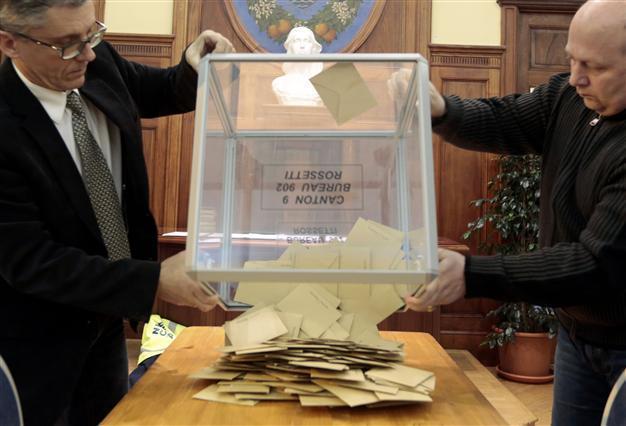France right-wing edges out National Front in local elections
PARIS - Agence France-Presse

Election officials empty a ballot box to count votes from the first-round local elections at Nice city hall March 22, 2015. REUTERS Photo
France's right-wing parties, led by former president Nicolas Sarkozy, edged out the far-right National Front to take first place in local elections on Sunday, in a crucial test ahead of 2017 presidential elections.The conservative alliance, including Sarkozy's opposition UMP, took 32.5 percent of the vote according to the latest polls, ahead of the governing Socialist Party led by much maligned President Francois Hollande.
The anti-EU and anti-immigration National Front (FN) led by Marine Le Pen, which had dominated the airwaves during the campaign, fell short of polls that had put it in the lead in the run up to the elections.
Provisional official figures gave the FN around 25.35 percent, behind the 30 percent or more it was tipped to win from French voters, dissatisfied with the stagnant economy and issues surrounding immigration.
The far-right party led the first-round vote in 43 out of 98 "departments" -- which have power over local issues such as school and welfare budgets -- that voted in Sunday's poll, according to interior ministry figures.
The FN is expected to go through to the second round in more than half of the 1,100 "cantons" -- an administrative division below "departments" -- that will vote again in a week, an AFP analysis of the data showed.
The party's best results "are concentrated in the southeast, particularly in the cities and near the cities it runs," said political scientist Jean-Yves Camus.
That put it ahead of Hollande's ruling Socialist Party, whose failure to address double-digit unemployment has seen him haemorrhage support since he took charge in 2012.
Provisional interior ministry figures gave the Socialists and their left-wing allies around 22 percent of the vote.
The mainstream parties will be able to call on smaller allies when voters return for run-off elections next Sunday, while the FN will struggle to find partners.
"There will be no local or national deal with the leaders of the FN," declared Sarkozy immediately after the initial figures were released.
The mainstream parties have closed ranks against the FN in recent weeks.
"Tonight, the far-right, even if it is too high, is not the leading political party in France," said Socialist Prime Minister Manuel Valls.
He called on voters to back either the left or right in next week's second-round run-offs to keep the far right from power.
The FN went into the elections polling neck-and-neck with Sarkozy's right-wing alliance of the Union for a Popular Movement and the Union of Democrats and Independents (UDI).
Le Pen returned to a common theme of her campaign after the results were announced, saying the mainstream parties were conspiring in a campaign of "hate" against her party.
She remained bullish about the initial results, pointing to the fact they were higher than the party's victorious tally in last year's European polls.
"This massive vote for the National Front that is taking root in election after election shows that the French want to rediscover their freedom," she said.
"Send home those who have brought France to her knees, and bring a new political generation to power."
Despite weaker results on Sunday, the FN has still enjoyed a run of strong results in recent votes, coming first in the European elections last year and winning control of 11 town halls.
Le Pen is hoping this momentum will carry forward to a successful run at the presidency in 2017. Earlier this week, she declared her party would "invade the Elysee (presidential palace)".
Her party has capitalised on anger over France's lacklustre economy, as well as the politically explosive issues of immigration and the integration of Islam into French society after the Paris terrorist attacks.
But it has also benefited from Hollande's disastrous popularity figures.
His ratings have hit record lows, despite a temporary boost in the wake of the January jihadist attacks on the Charlie Hebdo magazine and a Jewish supermarket, when he was credited with rallying the country.
Despite the recent rise of the far right, the Communist party (PCF) said it was confident of hanging onto the two departments it still controls in the Allier and the Val-de-Marne near Paris in tight second-round battles.
















